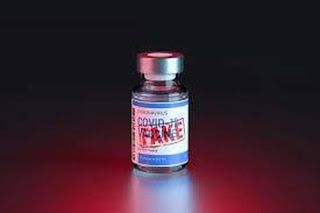While scammers have been selling fake or forged COVID-19 vaccination cards, another scam has been discovered involving counterfeit versions of the vaccine.
WSJ reports fake versions of the COVID-19 vaccine developed by Pfizer and BioNTech have been found in Mexico and Poland.
In Mexico, a man who claimed to be a biotech expert injected upwards of 80 people with the fake vaccine - charging $1,000 per dose. WSJ said none of the people had been physically harmed by the injection.
Dr. Manuel de la O, the health secretary of Nuevo León state in Northeastern Mexico, said fake vials of the vaccine were found in what appeared to be beer coolers. The counterfeit vaccines had "different lot numbers than those sent to the state and a wrong expiration date," the health secretary said.
Reports of counterfeit vaccines were also found in Poland, where authorities seized a stockpile from a man's apartment. The substance found inside the vials was likely an anti-wrinkle treatment, Pfizer said.
"Everybody on the planet needs it. Many are desperate for it," Lev Kubiak, Pfizer's world head of security, told WSJ. "We have a very limited supply, a supply that will increase as we ramp up and other companies enter the vaccine space. In the interim, there is a perfect opportunity for criminals."
Pfizer is also working with law enforcement on counterfeit vaccine cases like those recently uncovered in Mexico and Poland. Johnson & Johnson and Moderna are other top producers of COVID vaccines. They, too, are working with authorities to monitor fake vaccine distribution.
Across the world, dozens of websites have been shut down for fraudulently claiming to sell vaccines. Some of the websites appeared to be seeking personal information for identity fraud schemes than actually injecting people with vaccines.
In other countries, including China and South Africa, authorities seized thousands of doses of counterfeit vaccines, according to Interpol.
The National Intellectual Property Rights Coordination Center, an investigative arm of the US Department of Homeland Security, has also been investigating fraud related to the virus pandemic globally. Investigators have removed 30 websites and seized 74 web domains, according to IPR officials. So far, no counterfeit vaccines have been found on US soil.
Countries that are struggling to obtain vaccines appear to be the most prone to fraudulent schemes.
"Whenever you see this mismatch between demand and supply in certain areas, there are people who are willing to fill that difference with counterfeits," said Tony Pelli, a consultant with BSI Group who concentrates on drug security. "For new drugs, it's usually just a matter of time before you see people trying to counterfeit them."
What appears evident is that low-income countries struggling to obtain vaccines are ripe for fraud.











